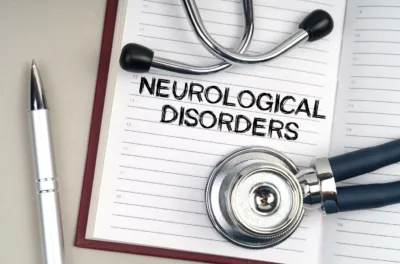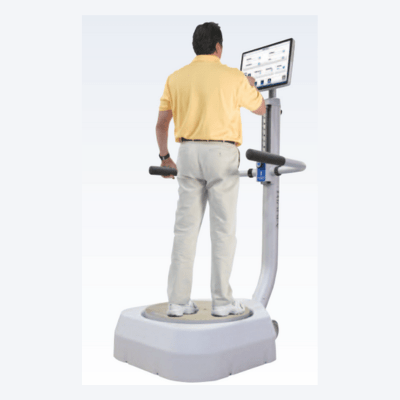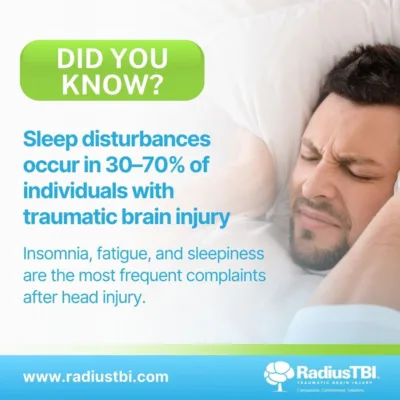Understanding SLEEP DISTURBANCES
Unveiling the Hidden Struggles of Rest
Understanding Sleep Disturbances
DID YOU KNOW?
Dealing with a traumatic brain injury (TBI) often means navigating a range of complications, one of the most prevalent being sleep disturbances.
Traumatic Brain Injury (TBI) is not just a physical affliction; it’s a complex journey riddled with multifaceted challenges. Among these, one often overlooked yet profoundly impactful aspect is sleep disruption. Astonishingly, research published by the National Center for Biotechnology Information (NCBI) reveals that 30-70% of individuals grappling with TBI encounter some form of sleep disturbance. This staggering statistic sheds light on the underexplored realm where TBI intersects with the delicate realm of sleep.
The repercussions of TBI reverberate beyond the initial injury, infiltrating the fabric of daily life with insomnia, fatigue, and excessive sleepiness. These sleep disorders serve as unwelcome companions, potentially exacerbating the already arduous path to recovery. Whether stemming from direct contact or acceleration/deceleration injuries precipitating TBI, the adverse effects on sleep cannot be overstated.
Navigating Sleep Disruptions: Insights into the Challenges of Restorative Sleep
Timely intervention is paramount. Diagnosis and treatment tailored to the specific sleep disorder can significantly mitigate its impact. From medication to Continuous Positive Airway Pressure (CPAP) therapy to behavioral modifications, a comprehensive approach is indispensable in addressing these disruptions effectively.
Within the Radius TBI community, solidarity is not just a concept but a cornerstone of support. As advocates for your well-being, we stand alongside you, recognizing the pivotal role of fostering good sleep hygiene in the journey to recovery. Remember, in the darkness of the night, you are never alone; we’re here, every step of the way.
Insomnia Unveiled: The Impact of Sleep Disturbances on Mental Well-being
Traumatic Brain Injury (TBI) stands as a somber sentinel of mortality and enduring debilitation in the United States, casting a long shadow over countless lives. The grim statistics paint a stark picture: an estimated 1.5 million Americans succumb to TBI annually, with 50,000 meeting untimely demise and 80,000 to 90,000 grappling with the onset of long-term disabilities. Moreover, a haunting echo persists as 5.3 million Americans grapple with permanent TBI-related disabilities, a silent testimony to the enduring legacy of these injuries.
The magnitude of this crisis is further underscored by a report to Congress on mild traumatic brain injury in the United States issued by the Centers for Disease Control and Prevention in 2003. The document serves as a chilling reminder of the pervasive impact of TBI, transcending mere numbers to encapsulate the profound human toll.
In the face of such staggering statistics, action is not just an imperative; it’s a moral obligation. Vigilance is paramount – early detection and intervention can be the difference between life and death, between debilitation and restoration. Thus, a clarion call resounds: Get Checked!
Navigating life with a Traumatic Brain Injury (TBI) can be tough, especially when sleep problems become part of the mix. But in the face of these challenges, there is a story of hope and resilience. With the right support and timely interventions, we can overcome the sleep disruptions that often accompany TBI.
At Radius TBI, we stand together, knowing that hope often shines the brightest during the darkest nights. We support each other and stress the importance of good sleep habits as a key part of recovery.
The statistics around TBI are a wake-up call for all of us to take action. By being vigilant and encouraging each other to get checked, we can work towards a safer and brighter future for everyone affected by TBI.
DID YOU KNOW?
TBI is a major cause of death and life-long disability in the United States. (including all levels of severity)
- An estimated 1.5 million Americans sustain a TBI (Sosin, Sniezek and Thurman 1996);
- 50,000 die from these injuries; and 80,000 to 90,000 experience onset of long-term disability (CDC 1999).
- An estimated 5.3 million Americans live with a permanent TBI-related disability today (CDC 1999).
According to the report to Congress on mild traumatic brain injury in the United States. Centers for Disease Control and Prevention; 2003. https://www.cdc.gov/traumaticbraininjury
Blogs

What therapies are available for individuals with neurological disorders resulting from head trauma?
At Radius TBI, our medical team collaborates to provide comprehensive care for individuals with neurological disorders resulting from head trauma.

Why See Neuropsychologist After Head Injury?
A head injury can be a devastating event that can have long-lasting effects on a person’s life. Depending on the severity of the injury, a person may experience a range of physical, cognitive, and emotional symptoms that can significantly impact

Workers Compensation Neurologist in Florida
We Are Dedicated TBI Team & We Are Accepting Workers Compensation. Call Us at 954-900-5072. We Are Here For Your Brain Injury Recovery.

Meet Our No.1 Best Neuropsychologist in Tampa, FL Location
At Radius TBI, we pride ourselves on providing exceptional care for individuals suffering from traumatic brain injuries (TBI) and concussions. Our integrated medical team in Tampa, FL, includes some of the most respected and experienced professionals in the field, ensuring

The Power of Balance Assessment Test: Unlocking TBI Treatment Options
A thorough balance assessment is an essential step in managing the symptoms associated with TBI-related balance disorders.



